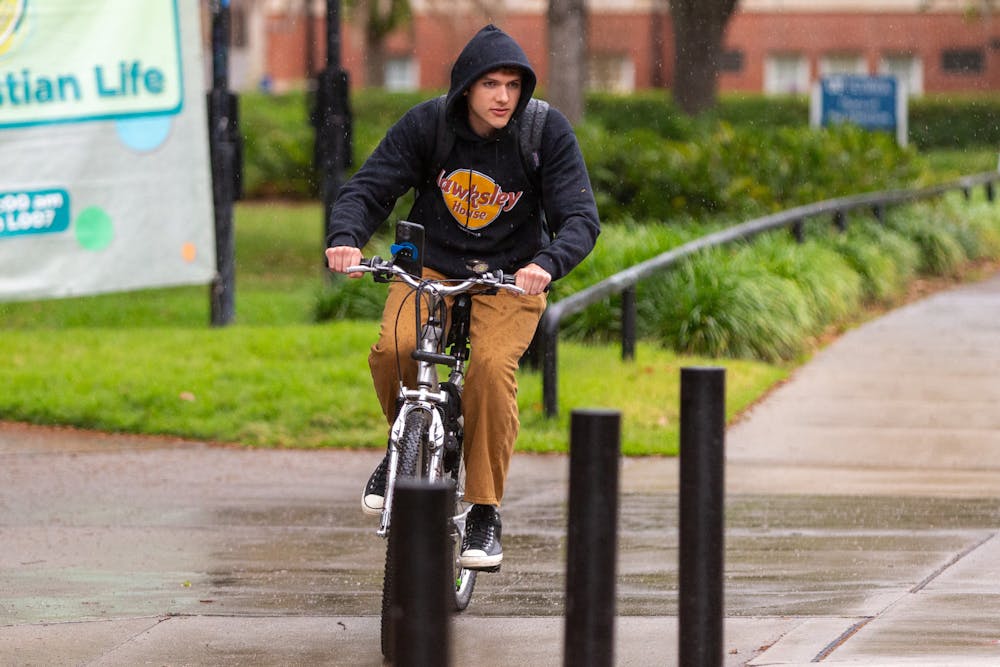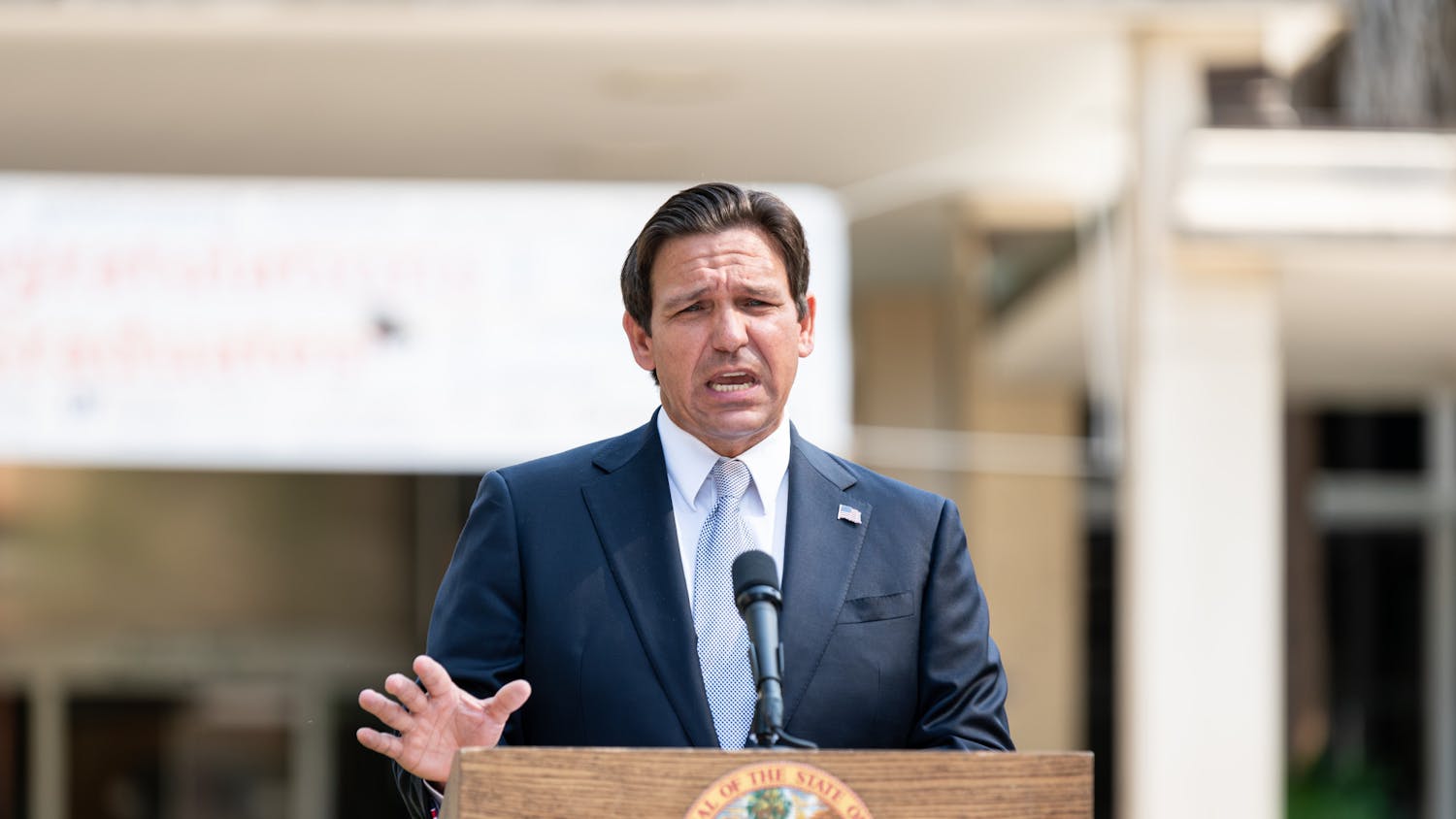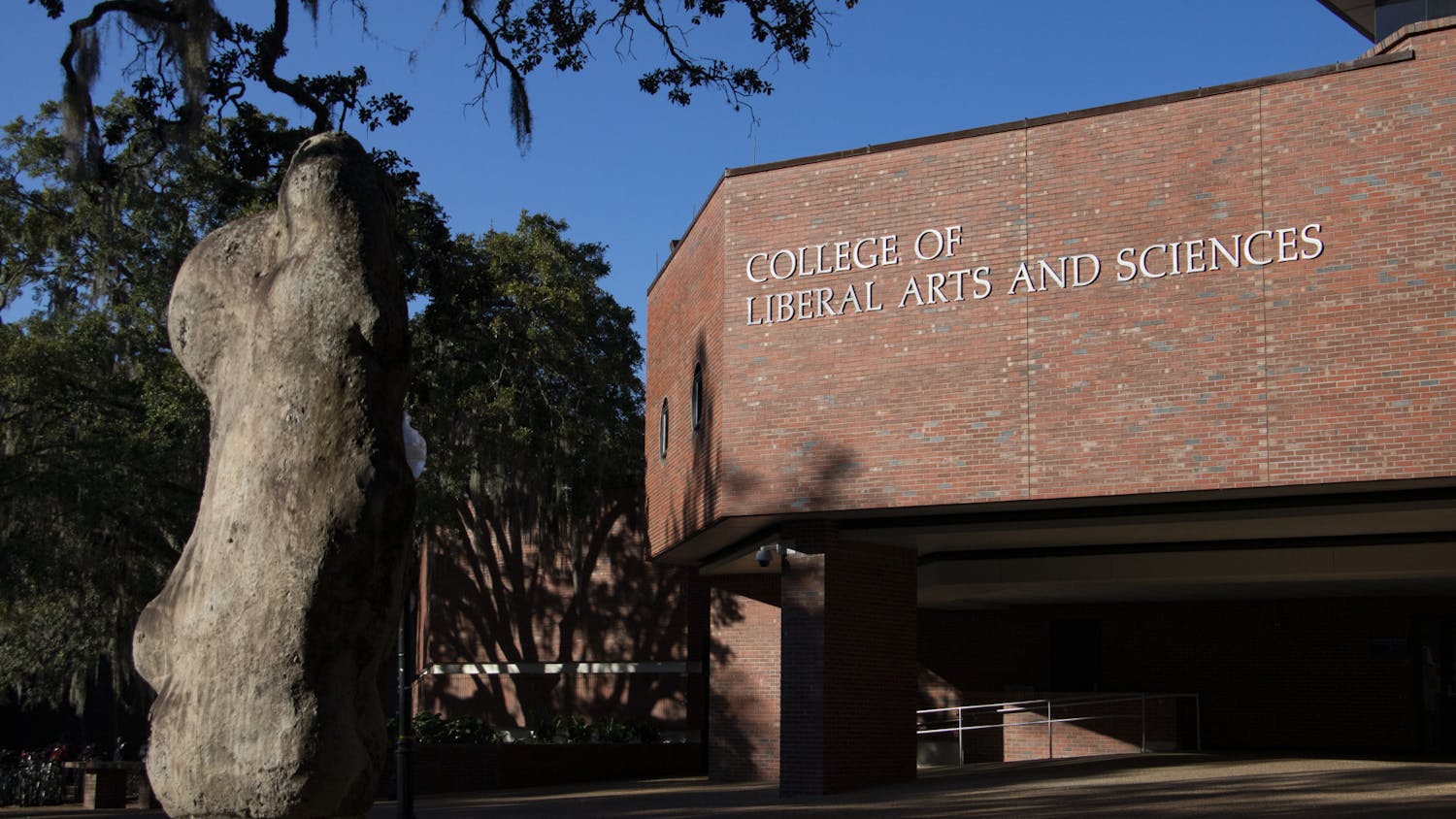Waterlogged sneakers squeaking on classroom floors. Students speed walking through campus with backpacks hoisted over their heads to block the downpour. A sea of umbrellas wandering across courtyards. For UF students, school is often synonymous with storms.
Anyone who stays in Gainesville for more than a few days will probably see rain. Anyone who stays in Gainesville a few minutes after that rain starts will inevitably hear someone call the city “Rainesville.”
UF students often believe — perhaps due to the inescapability of the “Rainesville” pun — that its frequent showers make Gainesville wetter than other Florida cities. But though Gainesville does rain often, it doesn’t stand out in Florida, which is a rainy state in general, said UF geography professor Esther Mullens.
“If you're saying purely from the standpoint of, ‘Does it rain a lot here?’ The answer is yes,” she said. “Whether or not it rains more than the areas around it, the answer I would say is that's probably a myth.”
Wet, hot Gainesville summers
Florida storms in general are both more intense and more summer-concentrated than in other states, said Mullens.
Because it’s surrounded by a “nice warm ocean,” Florida has lots of moisture and water vapor in the air, meaning when it rains, it rains hard, Mullens said. As a United Kingdom native, Mullens pointed out London, another notoriously wet locale, receives half of Gainesville’s annual rainfall. Its chillier northern temperatures create lighter — albeit steadier — drizzle, she said.
In the summer, Florida, as a thin peninsula, heats up rapidly every morning, while the ocean heats more slowly. The imbalance sets up a low pressure system in the middle of the state. Air rises, and thunderstorms result.
People sometimes assume coastal cities get more storms, Mullens said. But winds tend to push sea breezes inland before rising, so thunderstorms also bubble up in North Central Florida, including the Gainesville area, she said.
UF students who’ve spent summer semesters in Gainesville know its seasonal storms firsthand. Almost half of UF academic days in Summer 2023 saw rain, compared to less than one-third among Fall 2022 days and one-fifth of Spring 2023 days.
Wania Cardoso, a 36-year-old UF geography Ph.D. student, came to Gainesville a little over six months ago. As a Brazil native, she arrived well-prepared for her drizzly new home. But even living in the world’s rainforest capital didn’t prepare her for Florida’s summer showers, she said.
“I’m from the Amazon. We have a lot of rain — I’m used to it,” she said. “It rains a lot in my hometown, more than here, but if we’re talking about summer, then we have more rain here.”
Rainy winters: “the seasonal depression is real”
Levi Strodel, a 20-year-old UF political science and history sophomore, thinks Gainesville is rainier, more humid and generally “swampier” than his hometown Orlando. But it's not the rainy summers that bother him most.
“I feel like the winters here are harder — they’re just drearier, colder, wetter,” he said. “Honestly, the seasonal depression is real … especially if you’re from south or even central Florida, you’re just not used to it as much.”
Gainesville’s average annual 50 inches of rainfall far exceeds the U.S. average. However, it doesn’t stand out within perpetually wet Florida. Cities like Fort Lauderdale, Tampa, Orlando and Miami all reported higher annual rainfall over the last 30 years.
But breaking Gainesville’s rain into months reveals where the city differs from the norm — and where its “Rainesville” nickname may originate.
In winter months, Florida, as a state, gets less rain. But in Gainesville, though rain does slow down in the winter, it doesn’t do so as dramatically as other Florida cities.
Gainesville has steadier rainfall than Florida as a whole, and the city has above-average winter rainfall as a result. For example, in January and February, Gainesville’s average monthly rainfall dominated the state average by over two inches from 1993 to 2023.
The oddity of Gainesville’s winter showers could explain why UF students, many hailing from south of Gainesville, are put off by January and February’s cool, wet mornings and start to see the entire city as unusually rainy.
Strodel noticed his energy levels are lower on rainy and cold days, he said. But he doesn’t let that keep him from the long commute from his apartment to his attendance-mandatory classes, even though he doesn’t own an umbrella, raincoat or rain boots, he said.
“The other day, I heard some girls walking around, and one of the girls had rain boots on but the other one didn’t,” he said. “She was like, ‘I bet you wish you had some puddle stoppers now.’ And I was like, ‘Right?’ I'm walking out here in my Air Forces, the water is just seeping into my shoe.”
Sade Whitcomb, a 21-year-old UF computer science junior, sometimes can’t face the effect of cold rain on both her mood and her shoes. On those days, she gives into skipping class to preserve her Converse, she said.
“If I have to go outside and I know my shoes are going to get wet, I’m definitely in a little worse mood,” she said.
But Whitcomb takes a more optimistic view of Gainesville showers on her class-free days, which give her time to stay inside, lay under a blanket and catch up on her latest favorite K-drama, “Marry My Husband,” she said.
Changing climate, changing rain
Esther Mullens has worked at UF for the past six years to help develop the university’s first-ever meteorology major for undergraduates, which will debut Fall 2024. The two things that interest her students most are hurricanes and climate change, she said.
Gainesville’s inland position doesn’t protect it from thunderstorms, but it could be one of the reasons the city has recently avoided hurricanes, Mullens said. Hurricanes weaken quickly once they hit land, she said.
Of the four major Florida hurricanes to make landfall on the state in the last 10 years, just one, Hurricane Irma, brought daily rainfall over three inches to the city. Most recently, Hurricane Idalia left Gainesville largely unscathed when it shifted west toward Cedar Key last fall.
Three inches indicates “torrential” rainfall according to a Florida Climate Center study. At that level, rain can cause property damage and destroy agriculture and livestock. Since 2013, Gainesville has recorded rainfall over three inches on 16 days.
The city’s hurricane avoidance could, in part, stem from luck, added Mullens.
“It seems like this area, the nature coast of Florida, just hasn't historically received as many [hurricanes], but whether or not there's a reason for that, I don't know,” she said. “I think it's just the statistics. You know, the roll of the dice.”
Now, scientists say severe weather will become even less foreseeable due to climate change, said UF environmental horticulture agent Cynthia Nazario-Leary.
As a leader in the university’s Alachua County agricultural extension, which brings gardening knowledge to community members, Nazario-Leary monitors how the climate is changing and how she can educate new gardeners on those changes.
“Things will become less predictable,” she said. “Maybe instead of regular rain every day, we get one big storm that can cause more damage than if you would get a little bit of rain every day.”
Living on a peninsula and experiencing constant rain, Floridians often see water as an abundance, not as a resource to be protected, Nazario-Leary said.
“I have so many people call and be like, ‘Why do we have to worry about water? We’re surrounded by water,’” she said. “But Florida is basically a lot of sand. We have very good drainage. And so that water doesn’t stick around very long.”
Instead, much of Florida’s rainwater runs off and goes straight into the ocean, she said. She tries to emphasize conscientious water and fertilizer use when educating new Alachua gardeners, she said.
Good weather data will be key to understanding the city’s changing climate, said UF geography professor Yixin Wen. The former NASA employee was surprised when she came to Gainesville a little over a year ago and discovered the city doesn’t have a ground weather radar, which is the most accurate tool for measuring precipitation, she said.
The closest radars in Tampa and Jacksonville are too far away to share data with Gainesville, she said. Although meteorologists can use other types of satellites as well as traditional rain gauges to measure precipitation, Wen hopes to receive UF funding to bring a ground weather radar to UF soon, she said.
“It’s not right because the University of Florida is in Gainesville, and we have a very large population here,” Wen said. “For research purposes, we need to be better.”
While Wen and her meteorology colleagues focus on analyzing patterns in Gainesville’s rain, UF students will continue to be reminded of its effects on their waterlogged walks to class.
Gainesville’s rain may not be much higher than other Florida cities. But the “Rainesville” pun may just be too catchy not to stick around for years of UF students to come.
Contact Zoey Thomas at zthomas@alligator.org. Follow her on X @zoeythomas39.
Zoey Thomas is a second-year media production major and the university administration reporter for The Alligator. She previously wrote for the metro desk. Other than reporter, Zoey's titles include espresso connoisseur, long-distance runner and Wes Anderson appreciator.






